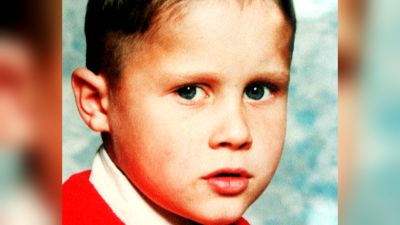Murder-accused James Watson explains why his DNA was on schoolboy Rikki Neave

A police officer’s son has explained why his DNA came to be on schoolboy Rikki Neave before he was murdered – despite only mentioning the detail more than 20 years later.
James Watson was only 13 at the time it is alleged he killed six-year-old Rikki in Peterborough on 28 November 1994.
Rikki was found strangled, stripped and posed in a star shape in woodland the next day.
Watson, now 40, was charged with Rikki’s murder after his DNA was allegedly found on the youngster’s discarded clothes.
He has accepted being seen with the victim on November 28 1994, when both children should have been at school.
Giving evidence on Monday at the Old Bailey, Watson told jurors that was the “first and only time” he had met Rikki.
According to his statement at the time, Watson had gone to the Welland Estate and was watching a digger when Rikki approached him at 12.30pm and they spoke.
“I then moved away and asked the workmen what they were doing. Rikki was walking back towards Redmile Walk.”
Watson accepted the evidence of residents who had seen him, saying he had no independent memory of it now.
“Pretty much all I can tell you is what I have read from other people’s statements,” he told the jury.
He said he spent four minutes with Rikki and only remembered years later that he had picked him up during the encounter.
Defendant picked Rikki up
Police had come to see him in prison because they wanted him to be “clear”, Watson said.
Asked why he did not mention it before, Watson said: “I believe I picked him up today but I cannot remember.”
He said he did it for Rikki "to look at the workmen working beyond.”
Watson said he went to see his former foster mother before returning to school to get a taxi back to the children’s home where he was living.
He denied going to the woods where Rikki was found dead, but said it was a place he would go when he lived with his father on the Welland Estate.
During his later interview, police appeared “taken aback” that he knew what DNA was, the defendant said.
He explained that he knew about it after being diagnosed as HIV positive in 2009.
Defence barrister Jennifer Dempster QC said: “Was any part of your answer in 2015 ‘I may have picked him up’ an attempt to tailor your account to fit the DNA in the case as it emerged later?”
The defendant denied it. He also denied that he intended to admit to sexually assaulting a five-year-old boy when he was asked in 2016 about an incident 18 months before Rikki’s death.
Watson's family life
Watson had been taken into care after his father, a serving officer with Cambridgeshire Police, was arrested and subsequently jailed, the court was told.
He could not stay with his mother because of the person she was living with, the jury was told. Watson said: “It was not my fault that I had to leave and go into care.”
He told the court he played truant "an awful lot" as he hated school, and "did not fit in". He explained he would be taken to school by taxi but would not go in, and would wait to be picked up again at the end of the day.
He denied ever going into the home of Rikki and his family on the Welland Estate in Peterborough.
Watson also denied a former girlfriend’s evidence that he once killed a sparrow with a stone, saying: “All my life I have always liked animals, and birds in particular.”
He also vehemently denied he had put his hands around her neck during sex, describing it as "completely wrong, untrue".
He told jurors that he later became involved in animal rights when he and a boyfriend lived in Cambridge. He added that he had always wanted to be a vet but did not have the qualifications, and was “really proud” that he passed an Open University course in animal care while in prison.
His lawyer, Jennifer Dempster QC, asked about a claim that he kept a “bespoke” clothing catalogue, featuring young children in underwear, in his room when he was in care. Watson replied: “Absolutely not.”
Three key points of defence
Earlier, in an opening address, Ms Dempster told jurors there were three issues in the defence case.
Firstly, the difficulty in pinpointing the time of Rikki’s death.
The second issue was whether the jury can be sure that Watson killed Rikki “given the state of the evidence”, she said.
Ms Dempster said it was “incontrovertibly” proven that Watson had met Rikki and there were a “few minutes” of interaction. But she claimed there was “simply no evidence” that he was in the woods for some two hours, during which time it is alleged he killed, stripped and posed Rikki.
Thirdly, Rikki’s body was found by a police officer the next day, shortly after noon. Yet, Ms Dempster said, another officer had searched the path where he was found just after 7.30pm the night before and Rikki was not there.
The defence lawyer suggested that if that was right, Rikki or his body was moved there under cover of darkness.
The “major consequence” of that would be to rule out Watson, as he would already have got his taxi back to the children’s home, she asserted.
Watson, of no fixed address, denies murder and the trial continues.